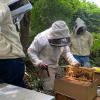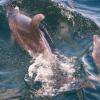Creating a TURF from the bottom-up: Antigua's community-based coral reef no-take reserve
Antigua's coral reefs are among the most degraded in the Caribbean region, having low coral cover, few herbivores, and abundant harmful macroalgae. Low fish biomass suggests overfishing may contribute to degradation and lack of recovery to a coral-dominated state. However, coral reefs declined so long ago that most stakeholders have never seen a healthy reef ecosystem. Therefore, fishers today may not be able to imagine ecosystem services provided by healthy reefs. No-take reserves can reverse degradation by increasing herbivore abundance, reducing macroalgae, and increasing juvenile coral abundance, which, with time, should increase coral cover. Although Antigua designated marine protected areas, they are functionally "paper parks" with low compliance due to inadequate management and enforcement, and little community support. In 2014, we conducted meetings and interviews with fishers resulting in a community-based, no-take reserve managed by fishers in their fishing territory, which is unprecedented in the eastern Caribbean Sea. Our objective was to create a demonstration project for the fishing community so they can see the effects and profit from spillover of adults into the area they fish. Fishers interviewed described their perspective of the reef and the history of fishing. They supported the creation of a demonstration reserve and assisted in monitoring for compliance. This is the first collective action known to have occurred among Antiguan fishers. After 1 yr, biomass increased significantly in the reserve for all targeted fish species and for non-target species. One year after the reserve was established, parrotfish biomass increased and macroalgae decreased significantly based on repeated belt and point-intercept transects, respectively.
Area of Interest: Antigua
Year: 2017




